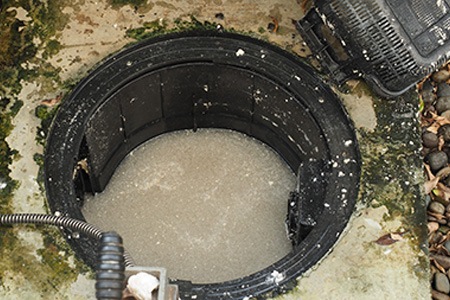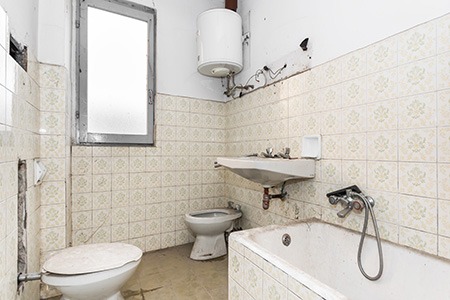My House Smells Like Skunk... What Do I Do?
Author: Anne Cowart | Editor: Omar Alonso
Review & Research: Jen Worst & Chris Miller

Did you walk into your home after a long day at the office to find the house smells like skunk? What's causing the foul stench, and how do you remove it? There could be several reasons for this occurrence, and all of them aren't good for your health or sinuses.
From gas leaks to dead animals, all the reasons why your house smells like a skunk had its way with it are problems you need to source and eliminate fast. The last thing you need in your home is a health hazard.
So is a skunk smell in your house dangerous? Yes, but fortunately, we put together this guide to help you identify and eliminate the problem ASAP.
What Is Sewer Gas & Is It a Health Hazard?

Many homeowners confuse sewer gas smells with natural gas. Natural gas manufacturers add a chemical called "mercaptan" to help homeowners identify a leak. Since natural gas is odorless in its raw form, if you have a leak, you might not notice it, and when you fire up the toaster in the morning – kaboom.
The additive to the gas releases an unpleasant odor, similar to rotten eggs. Unfortunately, many people confuse the odor of natural gas and sewer gas. Both are health and safety hazards, but you need to identify which is responsible for the smell and do it fast.
Sewer gas is a mixture of non-toxic and toxic gases and could be the reason why your house smells like a skunk setup shop somewhere. Sewer gas, like natural gas, is odorless. However, when methane and hydrogen sulfide mix, it creates a scent of rotten eggs.
Sewer gas comprises methane, sulfur dioxide, hydrogen sulfide, carbon monoxide, ammonia, nitrogen oxides, and other esters. According to the CDC, exposure to hydrogen sulfide at any quality in the air in your home has a toxic effect on the body.
A slight exposure to sewer gas won't make you sick. However, prolonged exposure to it can be harmful to your health. In small spaces, like your home, methane will force out the oxygen, and lead to you passing out, eventually stopping you from breathing, leading to death. Don't ignore it if your house smells like skunk.
What Are the Reasons for Sewer Gas Leaks?
There are several reasons why sewer gas could be leaking into your home. The following are the most common occurrences of sewer gas leaks.
- Sewage backups cause clogged drains
- Leaks in the septic or plumbing systems
- Blocked plumbing roof vents and air vents
- Dry plumbing from drains, toilets, or washbasins
What Are the Symptoms of Over-Exposure to Sewer Gas?

If you have a sewer gas leak in your home and don't notice it – maybe you have sinusitis and a blocked nose at the time, you risk overexposure to the gas, resulting in health complications. Some of the signs of overexposure to sewer gas include the following.
- Dizziness
- Nausea or vomiting
- Fatigue
- Poor memory recall
- Headaches
If you notice signs of overexposure to sewer gas, head to the emergency room for immediate medical assistance.
Do Gas Leaks Smell Like Skunk?
As mentioned, natural gas comes infused with a compound that smells like rotten eggs. Some homeowners describe the smell as burning rubber as well. If you notice any pungent odor in your home, the first thing to check is the gas connections. Ensure everyone waits outside the property while you inspect the place.
Don't turn on any fans. The electrical appliance might cause a spark, igniting the gas, resulting in a deadly explosion. Typically, sewer gas smells like rotten eggs, while natural gas or propane leak smells like skunk. Some people will describe it as smelling like vinegar or smelling like acetone so consider that as well.
What Do You Do If There's a Gas Leak in Your Home?
If there's a natural gas leak or sewer gas leak in your home, gather your family and exit the property immediately. Call the gas company and alert them to the gas leak. OR call a plumber and ask them to come and look at your plumbing system to find the source of the problem.
What Are Other Causes of a Skunk Smell in the House?

Why does my house smell like skunk besides gas? While natural gas and sewer gas leaks are the most common and most dangerous causes of why your house smells like skunk, there are other reasons for the occurrence as well. If you live in a suburb, it might actually be a skunk in your home.
If you suspect an animal invasion of your property, call the local animal control service, and have them come and inspect your property. However, the chances are it's not a climbing skunk in your house, and you have another problem on your hands.
Find the Source of the Skunk Smell
The first task involved with eradicating the skunk smell from your house is to find the source of the odor. In some cases, it might be that you went away on vacation, and an animal found its way inside your home and died somewhere in the house. It could be a sewer smell from your laundry room.
Most people lock up their homes when they go away on vacation. As a result, there's no fresh air moving inside the house through open windows or doors. However, a cat or rat might find its way inside and perish.
The first thing to do when identifying a bad smell in the home is to increase ventilation to the property. Open all the windows and doors and run a floor or ceiling fan to fast-track removal of the stench. Don't run the air-conditioning or HVAC system. The odors will enter the filtration system and stick.
While air-conditioners come with HEPA filters, the pungent odor might permeate the fibers and cause the presence of the smell even after removing the problem. Even if there's a trace odor of the smell afterward, it's enough to irritate you. Find the source, air out the house, and run the air-conditioner or HVAC.
Sometimes, there might be a dead rat or cat inside the ducting. Running the HVAC system will spread the smell through the house. If it seems like the odor source is coming from the ducting, call a professional to inspect the system, find the problem, and replace the filters on the unit.
How Do I Remove the Skunk Smell from My Home?

So, if you have a skunk smell in your house, the first thing you need to do is ventilate the space. Open the windows and doors and check the gas lines for leaks. If you notice the smell intensifying as you approach the gas line, you likely have a leak. As mentioned, get outside and call the gas company immediately. Don't return inside until the gas company repairs the problem and gives you the okay.
After ventilating the home, you might notice the smell lingers for a few hours afterward. We recommend pouring two cups of vinegar into a bowl and leaving it open in a room. You can repeat this for other rooms in the home. The vinegar smell absorbs the odors, returning the room to normal in 12 to 24 hours. Or you can try the same trick with coffee grinds and baking soda.
Citrus peels are also effective at absorbing odors. If you want a chemical solution, you can buy an air freshener from the store and spray it throughout your home to remove the odor and leave it smelling fresh.
You also have the option of running an air purifier. These devices pull air into a plastic or glass bowl filled with water and chemical absorbents. The water traps the odors and releases fresh-smelling air into the room.
FAQs for When Your House Smells Like Skunk

Whenever a person’s house smells like skunk and burnt rubber, a lot more questions arise. Let’s cover those now, especially if you woke up and your house smells like skunk today.
Does Mold Smell Like Skunk?
Yes, mold can have a musty odor like a skunk. Mold contains carboxylic acids, often with a tart, sour, unpleasant odor. Sometimes, they can smell rancid, depending on the mold variety.
The lactones in mold produce a fruity or creamy smell, and the terpenes in the mold can have a cheesy or skunky smell. If you have a mold infestation, you must find and remove it immediately. Mold present in your home is a health risk if you breathe in the spores.
Why Does the Clothes Dryer Smell Like a Skunk?
The particles moving through the dryer screen can eventually cause blockages in the screen leading to the steam reverting back into the water. The combination of water, and heat in the dryer vent, creates a scent similar to a dead animal or skunk. If the bad smell is coming from only one vent in the house, you can then determine where the problem is coming from, if not the dryer.
Why Does the Heat Smell Like Skunk When I Turn it On?
If you have a natural gas heating system and notice a skunk smell, it means there's a leak in the system requiring immediate repair. Leave home immediately and call the gas company to fix the problem. Only go back inside the property once the gas company approves the reoccupation of your home.
Key Takeaways for When it Smells Like Skunk in My House But Not Outside
- The primary cause of a skunk smell in the home is a natural gas leak in the heating system or cooking appliances like the stove or oven.
- Natural gas is odorless, but manufacturers add "mercaptan" to produce a skunk-like smell during a leak.
- If you have a gas leak in your home, leave immediately and call the gas company.
- It's common for homeowners to confuse natural gas and sewer gas leaks.
- Overexposure to sewer gas can lead to health issues; call a plumber for assistance.
That’s Why Your House Smells Like Skunk
Help, my whole house smells like skunk! Usually, if your house smells like skunk on the inside, it’s a case with either sewer gas or natural gas seeping into the atmosphere. It could be an actual skunk under the porch or in your crawl space. You’ll need to assess all three of these, because the first two are dangerous.




